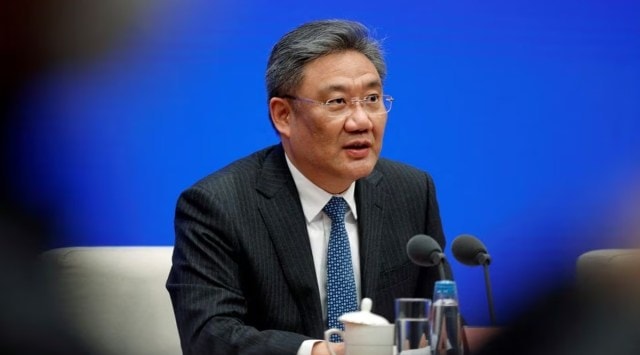අර්ධ සන්නායක අපනයනය සඳහා පනවා ඇති සීමාවන් නතර කරන ලෙස චීනය ජපානයෙන් ඉල්ලා ඇති අතර, එවැනි පියවර ජාත්යන්තර වෙළඳ රෙගුලාසි උල්ලංඝනය කරන අතර ද්විපාර්ශ්වික සබඳතාවලට හානි කරයි. ආසියා පැසිෆික් ආර්ථික සහයෝගීතා (APEC) සමුළුවේදී චීන වාණිජ අමාත්ය Wang Wentao, ඔහුගේ ජපාන සහකරු යසුතොෂි නිෂිමුරා සමඟ පැවති හමුවකදී තම කනස්සල්ල ප්රකාශ කළේය. චීනයේ වාණිජ අමාත්යාංශය සඳුදා ප්රකාශයක් නිකුත් කරමින් ජපානයේ යැයි කියන "වැරදි" නිවැරදි කිරීම සඳහා වන කැඳවීම සහ දෙරටේ සහ ගෝලීය සැපයුම් දාමයේ අවශ්යතාවලට සිදුවිය හැකි හානිය පිළිබඳ අනතුරු ඇඟවීම ගෙනහැර දක්වයි.
චීනය ජපානයේ චිප් අපනයන පාලනය හෙළා දකී:
අමාත්ය Wang Wentao ජපානය අර්ධ සන්නායක චිප් මත අපනයන පාලනයන් පැනවීම සම්බන්ධයෙන් විවේචනය කරමින්, රට වෙළඳපල ආර්ථික මූලධර්ම සහ සාධාරණ තරඟකාරීත්වය "බරපතල ලෙස උල්ලංඝනය කරන" බවට චෝදනා කළේය. මෙම ක්රියාමාර්ග ජාත්යන්තර වෙළඳ නීති රීතිවලට පටහැනි බව ඔහු වැඩිදුරටත් අවධාරණය කළේය. විය හැකි ප්රතිවිපාක පිළිබඳව වැන්ග් ජපානයට අනතුරු ඇඟවූ අතර ද්විපාර්ශ්වික ආර්ථික සබඳතා ආරක්ෂා කර ගැනීම සඳහා ගැටලුව විසඳීමේ වැදගත්කම අවධාරණය කළේය.
ජපානයේ ජාතික ආරක්ෂක උත්සුකයන් සහ විවිධාංගීකරණ උත්සාහයන්:
ජපානය මුලින් 2019 දී අර්ධ සන්නායක සහ ඒ ආශ්රිත ද්රව්ය පිළිබඳ අපනයන පාලනයන් දැඩි කළේ ජාතික ආරක්ෂාව පිළිබඳ කරුණු දක්වමින්. මෙම සීමා කිරීම් චීනය, දකුණු කොරියාව සහ තායිවානය වැනි ප්රධාන චිප් නිෂ්පාදකයින්ට සහ පාරිභෝගිකයින්ට බලපා ඇත. චීනයේ නිෂ්පාදිත චිප්ස් මත යැපීම අඩු කිරීමට සහ එහි සැපයුම් ප්රභවයන් විවිධාංගීකරණය කිරීමට ජපානය ද එක්සත් ජනපදය ප්රමුඛ ගෝලීය ප්රයත්නයන්ට සම්බන්ධ වී ඇත. අප්රේල් මාසයේදී ජපානය සිය දේශීය චිප් කර්මාන්තයට සහය වීමට සහ විදේශ ආයෝජන ආකර්ෂණය කර ගැනීමට ඩොලර් බිලියන 2 ක අරමුදලක් ප්රකාශයට පත් කළේය.
අර්ධ සන්නායකවල තීරණාත්මක කාර්යභාරය සහ සැපයුම් හිඟය:
අර්ධ සන්නායක යනු ස්මාර්ට්ෆෝන්, පරිගණක, මෝටර් රථ සහ වෛද්ය උපාංග ඇතුළු විවිධ නිෂ්පාදනවල භාවිතා වන තීරණාත්මක සංරචක වේ. COVID-19 වසංගතය චිප්ස් සඳහා ගෝලීය ඉල්ලුම තීව්ර කර ඇති අතර, බොහෝ කර්මාන්ත කඩාකප්පල් කර ඇති දැඩි හිඟයකට තුඩු දී ඇත. ලොව විශාලතම අර්ධ සන්නායක ආනයනය කරන චීනය, දියුණු චිප්ස් සඳහා විදේශීය සැපයුම්කරුවන් මත දැඩි ලෙස රඳා පවතී. කෙසේ වෙතත්, ස්වයං-විශ්වාසය සාක්ෂාත් කර ගැනීම සහ තාක්ෂණික නවෝත්පාදනයන් පෝෂණය කිරීම සඳහා රට සිය දේශීය චිප් කර්මාන්තය දියුණු කිරීම සඳහා සැලකිය යුතු ආයෝජනයක් කරමින් සිටී.
පළුදු වූ චීන-ජපාන සබඳතා:
චිප් අපනයන ආරවුල චීනය සහ ජපානය අතර සබඳතා පළුදු කර ඇති මතභේදාත්මක ගැටළු කිහිපයකි. භෞමික ආරවුල්, මානව හිමිකම් ගැටළු සහ කලාපීය ආරක්ෂාව සම්බන්ධයෙන් ද දෙරට අතර මතභේද පවතී. මෙම ආරවුල් නිරාකරණය කිරීම සහ සමුපකාර ආර්ථික සහ වෙළඳ සබඳතා වර්ධනය කිරීම ජාතීන් දෙකටම තීරණාත්මක වනු ඇත, ඔවුන් විකාශනය වන ගෝලීය භූ දර්ශනයක අභියෝගවලට සැරිසැරීමේදී.
චීනය චිප් අපනයන පාලනය නතර කරන ලෙස ජපානයට කරන ඉල්ලීම, තාක්ෂණ අංශයේ දෙරට අතර උත්සන්න වන ආතතීන් ඉස්මතු කරයි. මෙම ආරවුල ගෝලීය අර්ධ සන්නායක සැපයුම් දාමයේ වැදගත්කම සහ තාක්ෂණික කර්මාන්තයේ ස්ථාවරත්වය සහ සාධාරණ තරඟකාරිත්වය සහතික කිරීම සඳහා ජාතීන් අතර සහයෝගීතාවයේ අවශ්යතාවය මතක් කිරීමක් ලෙස සේවය කරයි. ශක්තිමත් ගෝලීය සැපයුම් දාමයක් පවත්වා ගෙන යාමට සහ අන්යෝන්ය වශයෙන් වාසිදායක ආර්ථික සබඳතා වර්ධනය කර ගැනීම සඳහා මෙම ගැටළු නිරාකරණය කිරීම ඉතා වැදගත් වේ.
China has called on Japan to halt its restrictions on semiconductor exports, asserting that such measures violate international trade regulations and harm bilateral relations. The Chinese Commerce Minister, Wang Wentao, expressed his concerns during a meeting with his Japanese counterpart, Yasutoshi Nishimura, at the Asia-Pacific Economic Cooperation (APEC) conference. China's commerce ministry issued a statement on Monday outlining the call to rectify Japan's alleged "wrongdoing" and warning of potential damage to the interests of both countries and the global supply chain.
China Condemns Japan's Chip Export Controls:
Minister Wang Wentao criticized Japan for imposing export controls on semiconductor chips, accusing the country of "seriously violating" market economy principles and fair competition. He further emphasized that these actions go against the tenets of international trade rules. Wang warned Japan about the potential consequences and stressed the importance of resolving the issue to safeguard bilateral economic ties.
Japan's National Security Concerns and Diversification Efforts:
Japan initially tightened export controls on semiconductors and related materials in 2019, citing national security concerns. These restrictions have impacted major chip producers and consumers such as China, South Korea, and Taiwan. Japan has also joined global efforts, led by the United States, to reduce its reliance on chips manufactured in China and diversify its supply sources. In April, Japan announced a $2 billion fund to support its domestic chip industry and attract foreign investment.
Semiconductors' Crucial Role and Supply Shortages:
Semiconductors are critical components used in various products, including smartphones, computers, automobiles, and medical devices. The COVID-19 pandemic has intensified the global demand for chips, leading to severe shortages that have disrupted numerous industries. China, as the world's largest importer of semiconductors, heavily relies on foreign suppliers for advanced chips. However, the country has been making substantial investments in developing its domestic chip industry to achieve self-reliance and foster technological innovation.
Strained China-Japan Relations:
The chip export dispute is one of several contentious issues that have strained relations between China and Japan. The two countries are also at odds over territorial disputes, human rights concerns, and regional security. Resolving these disputes and fostering cooperative economic and trade relationships will be crucial for both nations as they navigate the challenges of an evolving global landscape.
China's call for Japan to cease its chip export controls highlights the escalating tensions between the two countries in the technology sector. The dispute serves as a reminder of the importance of global semiconductor supply chains and the need for cooperation among nations to ensure stability and fair competition in the tech industry. Resolving these issues will be vital for maintaining a robust global supply chain and fostering mutually beneficial economic ties.





